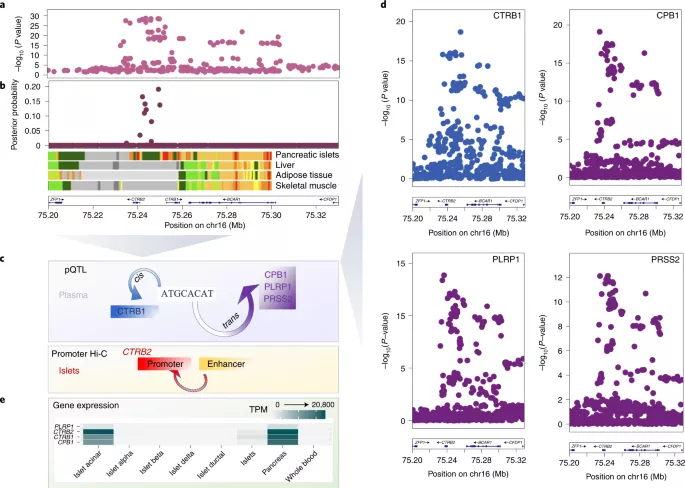According to the Centers for Disease Control and Prevention (CDC), 37.3 million Americans have diabetes. 95% of these people have type 2 diabetes, the most common type of diabetes Type 2 diabetes (also known as non insulin dependent diabetes or adult onset diabetes) is caused by the body's poor use of insulin. This long-term chronic disease causes excess sugar to circulate in the blood High blood glucose levels may eventually lead to cardiovascular, neurological and immunological problems.

There is currently no cure for type 2 diabetes, although weight loss, healthy diet and exercise can help people control their condition. The exact condition of type 2 diabetes is unknown, however, researchers have recently discovered a genetic link to the disease.
An international team of scientists, including genetic epidemiologists from UMass Amherst, is conducting an ongoing study in different populations around the world, which has revealed new and important insights into how genes lead to type 2 diabetes.
The study was published in [Nature Genetics] on May 12( https://www.nature.com/articles/s41588-022-01058-3 ) 》Up. "Our findings are important because we are moving towards using gene scores to measure a person's risk of diabetes," said Cassandra spracklen, co-author and assistant professor of Biostatistics and epidemiology at UMass Amherst School of public health and health sciences.

Andrew Morris, Professor of statistical genetics at the University of Manchester, and mark McCarthy and anubha Mahajan, professors at the University of Oxford, jointly led the meta-analysis of 122 different genome-wide association studies (GWAS) by Diamante (meta-analysis of diabetes cross ethnic association studies) alliance.
Morris said, "type 2 diabetes is a life changing disease. Its global prevalence has quadrupled in the past 30 years and affected about 392million people in 2015."
This research is an important step towards the ultimate goal of identifying new genes and understanding the biology of the disease, which may help scientists develop new treatments.
It is also an important milestone in the development of the genetic risk score to identify those who are more likely to develop type 2 diabetes, regardless of their demographic background.
The meta-analysis compared the DNA of nearly 181000 patients with type 2 diabetes and 1.16 million people without the disease. Genome wide association studies search the whole human genome for genetic markers called single nucleotide polymorphisms or SNPs, and look for genetic differences between people with and without certain diseases. The technology allows scientists to target the parts of the genome that are involved in disease risk, which helps identify the genes that cause disease.
However, the largest genome-wide association study of type 2 diabetes in history involves DNA of European descent, which limits the understanding of the progress of the disease in other population groups.
To address this bias, scientists from the Diamante alliance collected the most diverse genetic information about the disease in the world, with nearly 50% of the individuals from East Asia, Africa, South Asia and Hispanic populations.
"So far, more than 80% of such genomic studies have been conducted among people of white European ancestry, but we know that scores developed specifically for individuals of one ancestry do not work for people of different ancestry," spracklen said
Based on the previous research of spracklen, this new paper has determined the genetic association between type 2 diabetes and people of East Asian ancestry, and the genetic association between the characteristics (fasting blood glucose, fasting insulin, HbA1c) and diabetes in people of multiple ancestry.
"Since our study included people from many different parts of the world, we now have a more comprehensive understanding of the genetic risk patterns of type 2 diabetes in different populations," McCarthy said
Mahajan added: "we have now identified 117 genes that may cause type 2 diabetes, 40 of which have not been reported before. That is why we feel that this constitutes an important step in understanding the biology of the disease."
This international study was partially funded by the National Institutes of health, Wellcome and the British Medical Research Council.